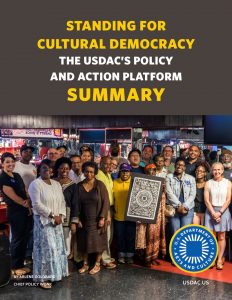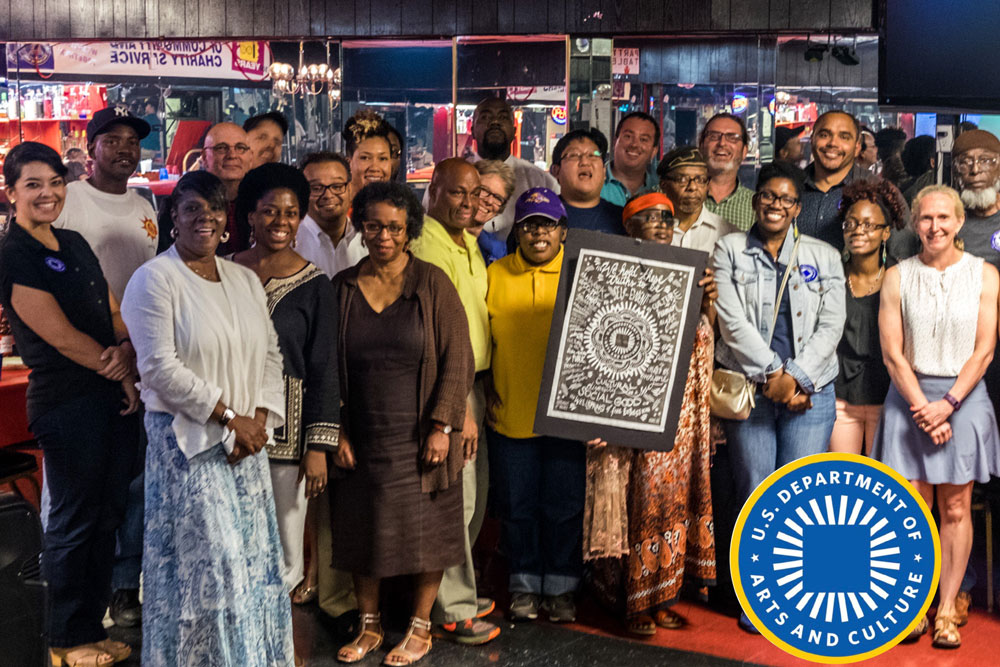USDAC launches Cultural Policy & Action Platform
At November’s Culture/SHIFT conference in St. Louis, some of my fellow cabinet members at the US Department of Arts and Culture (USDAC) took the stage. They were there to mark the launch a national “policy and action” platform we’ve been working on, titled Standing for Cultural Democracy. The platform outlines a ten-point framework for promoting arts, equity, and the universal right to cultural participation.
 It couldn’t have come at
a more important time. The campaign that elevated Donald Trump to the
presidency was fueled in large part by a discourse of cultural supremacy.
Trump communicated a vision of the US as a monoculture — a white, Christian
country where “good” immigrants and Muslims and People of Color might live
and work, but where they will never be fully “American.” The success of this
strategy has emboldened white supremacists and has fostered a climate of
uncertainty and fear for those that fall outside of this narrow nationalist
vision.
It couldn’t have come at
a more important time. The campaign that elevated Donald Trump to the
presidency was fueled in large part by a discourse of cultural supremacy.
Trump communicated a vision of the US as a monoculture — a white, Christian
country where “good” immigrants and Muslims and People of Color might live
and work, but where they will never be fully “American.” The success of this
strategy has emboldened white supremacists and has fostered a climate of
uncertainty and fear for those that fall outside of this narrow nationalist
vision.
Standing for Cultural Democracy, offers an antidote to Trump’s America. It is rooted in a vision of a pluralistic, participatory nation, where our multicultural makeup is exactly what makes us “great.” It proposes major investments in art and cultural work as a strategy for address pressing injustices in our country, whether that be gentrification, educational inequity, or the horrors of the prison system. More broadly, it promotes a shift in our national culture toward “equity, empathy, and belonging.”
HELP MAKE THIS PLATFORM A REALITY
- Download the Summary or the Full Platform.
- Endorse the policy and action platform
- Apply for a USDAC Lab Microgrant
- Take action in your community today!
The idea of cultural democracy is an important one to have in the national consciousness right now. First developed in the early 20th century, cultural democracy proposes a kind of multiculturalism in which there is no hierarchy, no center, no “high” or “dominant” culture. Its goal is pluralism rather than assimilation. It promotes not just inclusion but participation. It goes beyond tokenism to ensure that people of all cultural backgrounds have the resources and access they need to effectively participate in and co-create our national cultural fabric.
Cultural democracy has always stood as a bulwark against racist and nationalistic ideologies like those put forward by Trump and some of his supporters. As Don Adams and Arlene Goldbard write:
“Cultural democracy…was first espoused in the 1910’s and 1920’s by progressive thinkers such as Horace Kallen and W.E.B. DuBois. They advocated cultural pluralism in the face of widespread assertions of white superiority and nativist calls to delimit a single, true American culture, embodied most frighteningly in the resurgence of the Ku Klux Klan and other manifestations of xenophobic violence…Racist articulations of monoculture and liberal ideas of the “melting pot” both work against cultural democracy’s vision of a culture that accepts and respects diversity as a strength to be preserved rather than a problem to be resolved. As was the case in the early decades of the Twentieth Century, cultural democracy has always been an insurgent idea, pushing against dominant values, never gaining the ascendancy, but persisting because its essential truth resonates with the lived experience of people who refuse to be dismissed or “melted” down.”
The USDAC was founded on the principle of cultural democracy. One of its goals is to guide cultural policy in the US, from the grassroots up. So, over the last two years the USDAC has been involved in a massive, national participatory research project involving thousands of people at hundreds of local arts actions around the country. You can read about the findings of this work in the USDAC report, An Act of Collective Imagination. Now, Standing for Cultural Democracy synthesizes these findings into ten recommendations, along with concrete strategies, examples, and tools. These recommendations include:
- Adopt a “cultural impact study,” requiring developers to research the potential negative impacts of new development on the cultural resources and fabric of a community.
- Reform the culture of punishment that has led to our current status as “Incarceration Nation.”
- Implement a “rapid artistic response” system to address the cultural harm of natural and human-made disasters.
- And more…
Parts of the platform will require state- and national-level engagement. Progress will surely be slow, particularly in this political climate (though no less important for that). Others can be implemented today, right in your neighborhood, community, or city. So stop reading this blog and start reading the report. Check out the tools. Endorse it today. And then, let’s get started.



